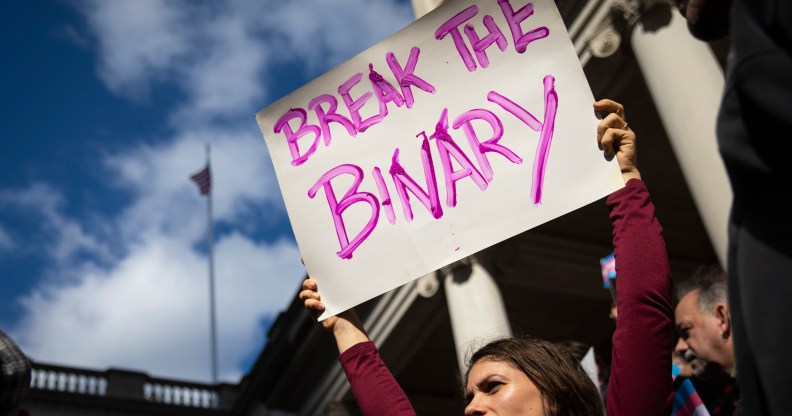Non-binary people win vital legal recognition as Maine becomes 12th state to issue ‘X’ gender birth certificates

Drew Angerer/Getty)
Maine became the latest US state to legally recognise non-binary citizens with accurate birth certificates, quietly making the announcement last Tuesday (14 July) – which was International Non-Binary People’s Day.
State leaders made it easier for non-binary adults as well as minors to update their birth certificates to reflect their true gender identity, having already moved to add an “X” marker on driver’s licenses and state identification cards in 2018.
Moreover, parents can choose a non-binary marker for their newborns as well, with the option to update later if needed.
Non-binary Americans must navigate a dizzying patchwork of varied legal recognition, meaning the gender markers on their identification documents tend to vary, which can cause trouble when doing banal things, such as opening a bank account or obtaining healthcare.
Some states offer a third gender marker only on some official documents, for example, state-issued ID cards such as a driver’s licence, but not other documents, such as a birth certificate.
Activists prasie ‘necessary and affirming’ change to birth certificate law.
According to an FAQ issued by governor Janet Mills’ office, adults and emancipated adults can apply for a non-binary marker on their birth certificate by submitting an application. As part of it, the FAQ stated, applicants must send “an individual notarised affirmation that the change is made to align the record with their gender identity”.
Parents of non-binary youth can fill out an application if they file “a declaration of a licensed physician or mental health care provider who… affirms that the requested gender is consistent with the minor’s gender identity”.
It comes after the Maine Center for Disease Control and Prevention said earlier this year that it is considering non-binary markers, according to WCSH.
The news was praised by local activists, who welcomed the new law as yet another leap for trans and non-binary folk in the state.
“These changes are really exciting and will make a significant difference in the lives of transgender folks like myself, and people whose gender identity is neither exclusively male nor exclusively female,” Gia Drew, programme director for the queer rights group Equality Maine, said in a press release.
“We’ve heard from so many people, as well as from parents of trans and gender-expansive youth, who’ve become so frustrated with the outdated process.
“I hope the news of these necessary and affirming changes bring some light to people during these unsettling times,” she added.
For non-binary Americans, identification documents are confusing, to say the least.
Confusion around gender markers on official documents is only heightened by federal agencies that administer passports and Social Security cards – only “M’ and “F” markers are offered. As a result, many LGBT+ groups are fighting for a more coherent, federal law on gender markers.
Colorado, New Jersey, Utah, New Mexico, Illinois, Nevada, Rhode Island, California, Washington, Oregon and Connecticut have all introduced legislation offering residents the option for third gender markers on birth certificates, according to monitoring groups, making Maine at least the 12th state to do so.
But some states, such as Kanas or Tennessee, forbid gender markers being changed altogether on any documents.

